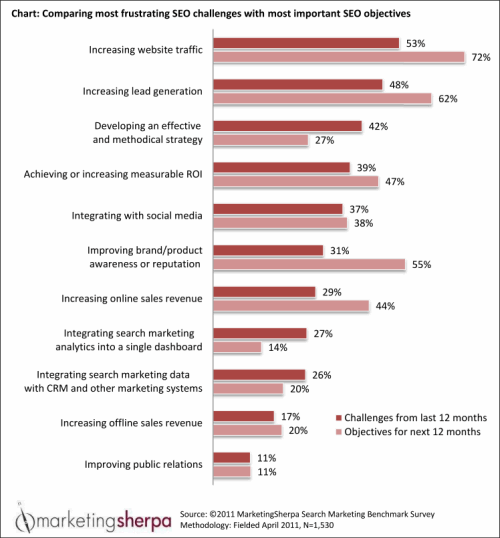
As search engines and the online user community advance and mature, a fun and important to-do, is watching how the web evolves. (Not sure who’s wagging who or what). But, it’s exciting to see the changes in terms of the content, multi-media, rich applications and user experiences now available. HTML5 is coming up fast, and Flash is taking a plunge into the dirt.
These changes are true across many devices, from web browsers to portable devices like smartphones and iPads. And, a prognosis by Morgan Stanley says that there will be more people using portable devices for the Internet in 5 years than there are desktop users.
When it comes to search engine optimization, the trade, markets & competitors change often. Google is still the leader in search, and announced they make (on average) some 500 changes to their core algorithm. The last 12 months have been brutal on many out there. It’s for a “good cause”. (Google makes more money!)
So, it’s not just about good market & technical understanding, architecture, design and content, but about ‘marketing 360’. And, do you study offline marketing and sales materials that come to your door step? (I do)
It’s no longer enough to analyze, understand and apply changes in tags.
The professional work is far beyond that (and has for a while). For example, spamming / stuffing keywords and cloaking is easily detected by search engines. And, professional SEOs know all this. They have applied themselves and evolved too. The ones that are lagging behind are catching up.
So have the search engines, and we’ll cover some recent findings and results on what you need to do in 2012 to stay current with your website optimization practices.
Industry reports, research, polls, blogs, white-papers and forums show conversations and updates about the many changes. Google themselves post updates in blogs, from their specialized products to webmastering rules and guidelines.
This is important to watch and follow, but you should ultimately make sure to track your own work. Go by best practices (if I can say that), but perform your own assessments. And, if you are just tracking ranking patterns, you’d be so 2005.
The top challenges for 2012 for all three types of online businesses (testing / trial category, transitional category and strategic category) are focused around building sound strategies. Findings show that ROI-based outcomes take a higher precedence than actually defining a top level strategy!
This is further substantiated by MarketingSherpa and the recent SEO benchmark data:

Going forward this year, you must always focus your business online with content. Add keywords and phrases to support that. And, learn to promote (not spam) more + better.
And here are the 12 SEO tactics you must focus on for 2012:
(these are not in order of focus)
1. Title tags
2. Meta description tags
3. Internal linking
4. URL structure
5. Keyword research
6. SEO landing pages
7. Digital asset optimization (video, pictures…)
8. Competitor benchmarking
9. Social media integration
10. Blogging (different from social media)
11. Link partners
12. Content creation (and content marketing)
The most effective and most difficult is ‘content creation’ (#12). Combine this with TITLE tags, keywords research and development & SEO landing pages, and you have the smartest tactics that will propel you forward. Of course, you need to look at them all. In fact, start with the planning & strategy to meet your objectives (you know those, right?) — then, match up the tactics and assign resources (human) to get them done.
What is your biggest PAIN in your SEO this year?
